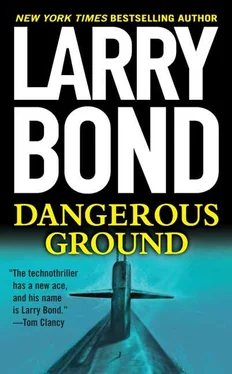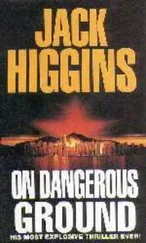Berg grinned. “Really? I’ll bet the Russians have a better one. Should we ask?”
Senior Chief Leonard, the offgoing Chief of the Watch, came over and reported to Millunzi. “The watch is relieved, sir.”
“Very well, Senior Chief. See you in the morning,” Millunzi responded.
Millunzi turned back to Berg and Jerry. “That’s it? Any questions? My rack is calling.”
“I won’t keep a man from his rest,” Berg replied, smiling. “I relieve you, sir.”
The offgoing watch section cleared out quickly, and Jerry settled in. Aside from some careful navigation and frequent depth checks, he was looking forward to a quiet, uneventful six hours.
“The biggest challenge on this watch is gong to be staying alert,” Berg prophesized. “Homebound watches are dangerous. Everyone starts to slack off. They’re too busy thinking of home and hearth, and not paying enough attention to their indicators.”
“Even in the Kara Sea?” Jerry asked, half-joking.
“It’s a state of mind, not a position on the chart. Check the fathometer every five minutes, and we’re going to come up with some drills for the control room team.” He looked at the qualification book Jerry had brought along. “What are you working on now?”
“I thought maybe the communications systems.”
“Since you knew you were going to be stuck with the comms officer for six hours in the middle of the night. Well done, Mr. Mitchell. Stand by for some merciless questioning.” He paused, with his ever-present smile, then ordered, “All right, get busy.”
Trying to start a habit, Jerry checked the fathometer — two hundred forty feet under the keel and six hundred above. Good. He started a detailed check of every instrument, every switch setting in the control room. Behind him at the chart table, Lenny Berg made a conspicuous display of sitting back and opening Jerry’s qualification book.
Jerry was a quarter through his inspection when Berg hit him with the first question. “What frequency range does the UHF whip cover?” Jerry answered correctly and continued checking. Lenny hit him with a question every three or four minutes, which was also Jerry’s cue to check the fathometer and review the quartermaster’s update of the chart.
They were forty minutes into the watch when sonar jarred them out of the routine. “Conn, sonar. We’ve detected some sort of explosion, bearing one four zero.”
Jerry felt adrenaline flash like electricity through him. Berg, along with the rest of the watch, sat up quickly, but he didn’t speak. He looked as if he expected Jerry to, though.
Jerry stepped over to the intercom. “Sonar, conn. Can you tell how big?”
“Conn, sonar, Very small or very far away,” replied the sonarman. “No other activity, either, just that one transient.”
“Conn, sonar aye.” Jerry responded, still puzzled. He didn’t like mysteries, and he looked toward Berg, but Lenny looked puzzled as well.
Well, whether this was one of Bair’s drills or not, all he could do was play it by the book. Step two was to tell the Captain. Jerry picked up the phone and dialed the Captain’s cabin.
“Captain.” Hardy had picked it up on the first ring.
“Officer of the Deck, sir, sonar reports hearing an explosion some distance behind us. Either very distant or a very small explosion.”
“Very well, I’m coming.”
Hardy was there in less than a minute, fully dressed. He was still studying the chart when sonar made another report. “Conn, sonar, we’ve detected a second explosion, bearing one five zero. It’s closer this time or a bigger explosion.”
Hardy pressed the talk switch. “Sonar, conn, verify that you hold no other contacts.”
“Conn, sonar, confirmed. We hold no other contacts.”
“Then it’s aircraft,” Hardy said.
Dr. Patterson came into the control room in a robe and pajamas. “Did someone say they’d heard an explosion?” Patterson’s robe was long and white, and it had the insignia of the White House embroidered on it. She managed to look sleepy and alarmed at the same time. Emily Davis followed her in, having taken time to dress.
Hardy looked annoyed but didn’t reply, so Jerry ventured, “Sonar’s detected explosions behind us. We don’t know what they mean.”
“Wrong, Mr. Mitchell,” Hardy corrected.
“Conn, sonar, we’ve detected a third explosion, this one to port, bearing two nine five. Classify explosions as echo-ranging line charges.”
“Sonar, conn, concur with your assessment,” Hardy answered. “Keep a sharp lookout for anything that sounds like a Bear Foxtrot.”
“Conn, sonar aye.”
Jerry had to remember his sub school classes on allied and foreign ASW systems. The U.S. Navy used explosive echo-ranging back in the 1950s, before active sonobuoys entered the Fleet. The theory behind explosive echo-ranging was simple enough. Lay a field of passive sonobuoys, then drop small explosive charges. The buoys not only picked up the sound of the explosion, but any echoes off the hull of a submerged sub. The U.S. Navy stopped using the technique in the 1970s, however, because in practice it proved a lot harder to do.
The Soviets, on the other hand, had never given up on the idea, and they perfected it long before the West did. It was used to find quiet submarines operating in shallow water. Like Memphis in the Kara Sea.
It meant that there was a passive sonobuoy field near them, which had been laid by antisubmarine aircraft. Now they were monitoring the field and dropping charges, trying to find them.
“The charges are small ones,” Hardy explained. “They’re less than a pound, not much more than grenades. If they get close enough, though, they’ll find us.”
“But why didn’t we hear the aircraft this time?” asked Patterson, showing a hint of fear.
“They’re probably up high enough that the blade noise was attenuated before it reached the water. They didn’t want to spook the prey,” replied Hardy flatly. “Good tactics on their part.”
It was a nasty situation. Go fast to get away from a sonobuoy field, and you’d make enough noise for the passive buoys to pick up. Creep along, and you’re in the field long enough for them to locate you with the explosive echo-ranging.
“Mr. Berg,” the Captain ordered, “come right to course zero six zero, speed five knots. Mind your depth. I want to keep us as close to the bottom as possible and rig ship for ultra-quiet. Ladies, I need you to return to your stateroom.” Without protest, Patterson and Davis left control.
Jerry only glanced at the chart, but it was clear Hardy was taking them out of the trench, which was the sensible thing to do. The trench was an obvious route for any sub trying to leave the area, so the Russians had laid a barrier across that ten or fifteen miles. Leave the trench, and now their quarry could be anywhere in the Kara Sea. Except the trench, of course.
Lenny Berg repeated the Captain’s course and speed order and ordered Memphis down to eight hundred feet. That left sixty feet under the keel. “Jerry, get over there and watch that fathometer. Report the depth every time it changes more than ten feet.”
“Aye, aye, sir,” Jerry answered.
“Conn, sonar, more explosive charges, to the north and the south.”
“Sonar, conn aye,” Berg replied, with Hardy nodding his understanding. The Russians were closing in, bracketing their position, but Memphis was already doing what needed to be done.
Jerry kept his eyes glued to the fathometer. “Depth is eight four zero feet.”
Berg replied, “Understood,” and continued working at the chart. He ordered, “Diving officer, make your depth seven eight zero feet.”
Chief Swanson repeated the depth and double-checked the planesman as he brought the boat up to the new depth. Jerry called out the depth as the bottom sloped upward.
Читать дальше












